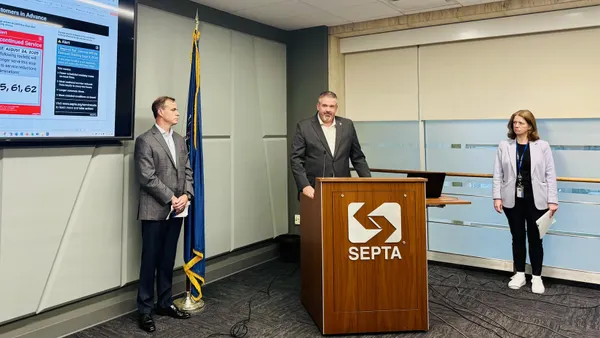The following is a viewpoint from Illinois Commerce Commission Commissioner Anastasia Palivos, and Ritta Merza and Emily Brumit, legal and policy advisors to the commissioner.
Amid never-ending political debates on the validity of climate change, commercial and service fleet companies are being proactive in efforts to reduce global carbon emissions.
According to the U.S. Environmental Protection Agency, in 2016, the transportation sector, which includes the transportation of people and goods by cars, trucks, trains and other vehicles, produced almost one third of U.S. greenhouse gas emissions (GHGs). While the federal government has turned a blind eye to GHGs’ impact on the environment, public health and the economy, the private sector has already implemented significant efforts to address carbon emissions. Companies like Ryder, UPS and Lyft noticed an opportunity to make a significant impact in the transportation sector through electrification and took action.
Ryder, Lyft, UPS electrify
Ryder is a full-service car leasing company for businesses of all sizes. Ryder currently manages over 230,000 vehicles and is relied upon by more than half of Fortune 500 companies. Ryder has recently teamed up with Chanje, a zero-emissions, one-hundred percent electric vehicle (EV) manufacturer, to electrify its extensive fleet and create an EV market that businesses can dive into when considering which medium-duty truck to utilize for their business. Ryder’s commitment to transportation electrification will allow the company to significantly reduce carbon emissions and costs of fuel and operation over the long run.
Another sector of the transportation industry that is rapidly growing is the last-mile delivery sector. With the growing popularity of eCommerce, customers are expecting deliveries faster and at lower costs, putting more pressure on delivery companies like UPS.
The company has approximately 35,000 diesel or gasoline trucks on the road. However, it has become a leader in transportation electrification with multiple ongoing efforts. Most recently, UPS teamed up with Workhorse, an original equipment manufacturer that has been developing several different EV models. Their goal is to deploy 50 all-electric delivery trucks by the end of the year and conduct tests primarily in Atlanta, Dallas and Los Angeles. UPS aims to continue deploying EVs after 2018 and ultimately electrify the entirety of its massive delivery vehicle fleet.
Ride-share company Lyft has also taken initiative to reduce carbon emissions by pleading carbon-neutrality. The company is investing in carbon credits to actively offset the pollution produced by its more than 10 million rides provided worldwide, each week. In a statement published on June 15, 2017, the company went even further, promising to provide at least 1 billion rides per year using electric autonomous vehicles by 2025. All electric autonomous cars will be powered by one hundred percent renewable energy from the day they are deployed.
Federal and local incentives
Although the current lack of initiative towards carbon reduction on a federal level is frustrating, a federal tax credit for the purchase of EVs is available. Fleet managers can take advantage of the federal tax credit ($7,500) when purchasing EVs for their companies, but not for long. Automakers have a cap of 200,000 rebates per original equipment manufacturer (OEM) before the tax credit begins to phase out. The incentive will soon expire for early movers like Tesla and GM, as they began selling EVs before many other manufacturers joined the trend.
This credit sunset arguably chooses winners and losers in the automotive industry, so a new bill to officially remove the 200,000 sale threshold has been introduced in Congress. Rep. Peter Welch, D-VT, unveiled H.R.6274, which will also change the credit to a direct rebate, instead of having to wait for your next income tax return. It restores the federal tax credit for charging stations, too. Supporting legislation like H.R. 6274 will become increasingly important to companies and municipalities looking to electrify their service or delivery fleets at an affordable cost.
State governments and local municipalities should pay attention to the changes unfolding in the transportation industry, as they are significant and impactful. Local governments can facilitate and incentivize transportation electrification and thereby lower carbon-emissions across the country.
Programs like Drive Clean Chicago’s Drive Clean Truck Program is a great example of an innovative incentive program that encourages the use of alternative fuel and EVs. Fleet owners, leased vehicle operators, OEMs and vehicle technology vendors are all able to participate in the voucher program to serve the city of Chicago.
Funding for this program comes from the federal government and CALSTART administers Drive Clean Chicago. The program reduces the total sales price of new EV trucks and buses for purchasers and reimburses the amount to sellers. In Chicago, total funding for the program is $11.3 million and it operates in six counties.
Recently, the Federal Transit Administration’s "Buy America" program began requiring that steel, iron and manufactured goods used in the projects are all produced in the United States. Many manufacturers are not able to qualify for a waiver of this requirement. As a result, funding is tied up.
Reducing our reliance on internal combustion engines is key to cutting carbon emissions. Government incentives or not, many states in the U.S. are well on their way to meeting carbon reduction and electric vehicle sales goals, thanks to the private sector and companies like Ryder, UPS and Lyft. While a majority of the U.S. is playing catch-up with EV-friendly states like California, new programs like Drive Clean Chicago will help boost market advances to create a holistic approach to EV deployment.










